Best Books to Read in 2023
Best Books to Read in 2023 Are you a bookworm or a bibliophile, if yes, then this is the ...
Academic accomplishment no longer determines a student’s life preparedness in today’s fast-changing environment. As educators and parents, we understand the necessity of developing children’ social and emotional well-being to improve their overall talents. Social Emotional Learning (SEL) can help here. SEL develops pupils’ intellectual and social-emotional skills. Self-awareness, self-management, social awareness, connection skills, and responsible decision-making help pupils succeed in life.
Also, read Top 10 Educational Magazines for Students
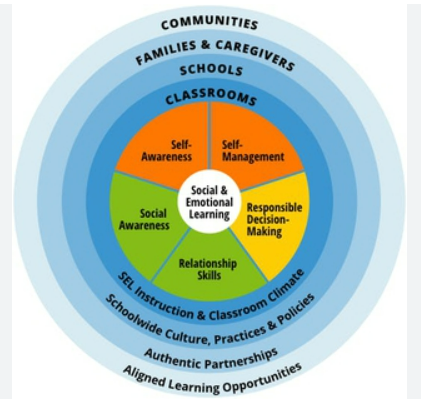
Social Emotional Learning helps students manage relationships, endure hardship, and make appropriate decisions outside academic areas. Self-awareness helps pupils comprehend their emotions, strengths, and flaws. Self-management abilities help them control their emotions, create objectives, and persist. Social awareness develops empathy and compassion, helping children accept variety and form meaningful connections. Strong connection skills help kids collaborate, communicate, and overcome disputes. Responsible decision-making helps them make ethical decisions and examine the repercussions.
SEL prepares students for academic, professional, relational, and personal success. Students learn both academic and social-emotional abilities through SEL. As educators, parents, and communities, we must recognise and use SEL in education to empower children and improve the future.
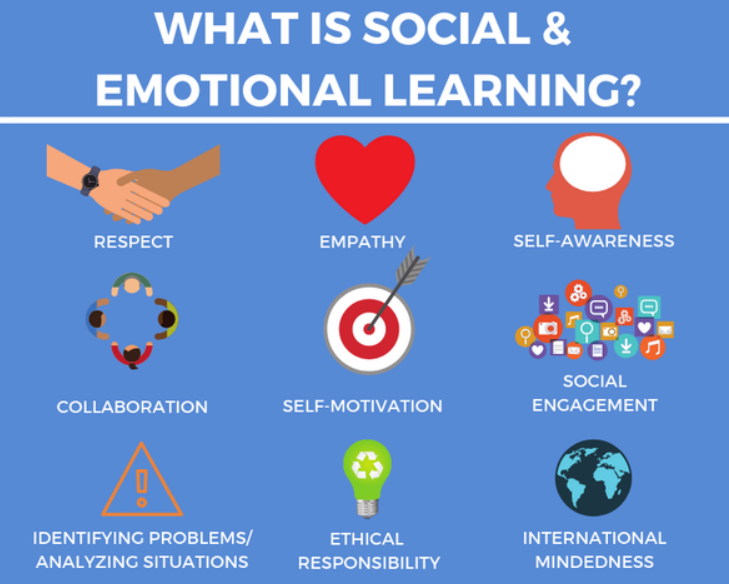
Self-Awareness
Self-awareness is knowing one’s feelings, strengths, flaws, and values. It helps pupils recognise their strengths, weaknesses, and potential. Self-awareness helps kids regulate their emotions, make smart choices, and build self-esteem.
Self-Management
Self-management involves managing emotions, desires, and objectives. It requires self-discipline, stress control, and time management. Self-management helps pupils overcome problems, adapt to change, and persist.
Social Awareness
Social awareness means understanding and empathising with others. It fosters diversity, inclusion, and respect. Socially aware students can manage social complexity, collaborate, and form healthy relationships. They also grow more civic-minded.
Relationship Skills
Communication, listening, collaboration, and dispute resolution are relationship skills. Healthy connections with classmates, teachers, family, and the community require these qualities. Relationship-savvy students can collaborate, settle problems, and manage interpersonal dynamics.
Responsible Choices
Responsible decision-making entails ethical and informed decisions that benefit oneself and others. It involves critical thinking, problem-solving, and evaluating outcomes. Responsible decision-making abilities help students handle complicated situations, make values-based decisions, and improve their communities. These elements provide students with a complete education.
Also , read Top 5 Interpersonal Skills that students must have
Academic Success
SEL improves academic performance, according to research. SEL skills help pupils learn and improve academic achievement. SEL programmes boost test scores, graduation rates, and attendance.SEL improves classroom concentration, motivation, and self-regulation. Students may adjust their learning methods by being self-aware of their strengths, limitations, and learning styles. Goal-setting, time management, and organisation help pupils focus and succeed in school.
Emotional Health
SEL helps pupils’ mental health and emotional intelligence. SEL helps kids recognise and control their emotions. They learn to recognise and express their emotions, preventing emotional issues and improving well-being. Understanding and managing emotions helps pupils with stress, anxiety, and other emotional issues. Resilience, coping skills, and positivity boost mental health. SEL programmes can foster open communication and help-seeking by reducing mental health stigma.
Social Skills
SEL improves kids’ social skills, empathy, and understanding, helping them form healthy connections. SEL teaches kids good communication, active listening, and collaboration, helping them negotiate interpersonal dynamics.Empathy and understanding help pupils accept others’ viewpoints, experiences, and cultures. This increases classroom inclusion, lowers tensions, and creates a sense of community. SEL teaches kids how to work together, resolve disagreements, and collaborate.
Lifelong Success
SEL skills may be used throughout life. SEL equips students for professions, relationships, and well-being.
Employers emphasise SEL qualities including communication, teamwork, and problem-solving. SEL helps students adjust to varied workplaces, collaborate with coworkers, and resolve disagreements.
SEL also promotes happy partnerships. Social awareness and relational abilities help people make and keep friends. They develop empathy, understanding, and social skills.
SEL encourages values-based decision-making for personal well-being. It develops critical thinking and problem-solving skills for personal issues. Self-care, self-advocacy, and a good self-image promote happiness and fulfilment.
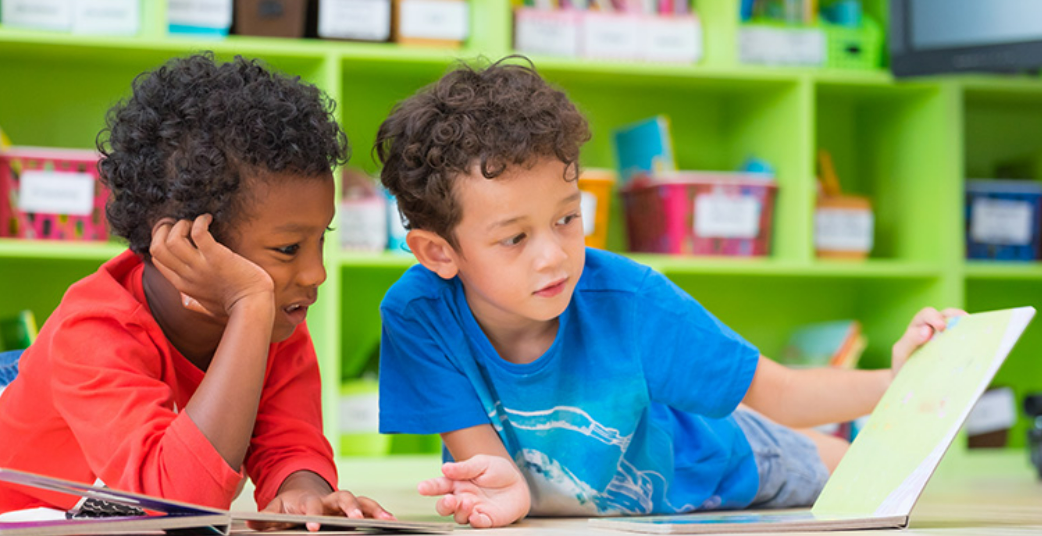
Schools can use many methods to integrate Social Emotional Learning (SEL) into the curriculum:
Teacher Training
Educators need extensive professional development. Teachers may learn how to integrate SEL practises into their teaching through training, seminars, and continuous assistance. Teachers may learn to establish a pleasant classroom environment, implement SEL activities, and meet students’ social and emotional needs.
Positive School Climate and Supportive Learning Environment
By promoting belonging, respect, and emotional safety, schools may encourage SEL. Restorative practises, kindness, empathy, clear behaviour standards, and student support can achieve this. To encourage learning, schools may build strong relationships between teachers, students, parents, and the community.
Social Emotional Learning in Lessons and Activities
SEL may be included into lesson planning across disciplines and grade levels. SEL may be taught in language arts, social studies, math, and science. They can create self-reflection, cooperation, problem-solving, and perspective-taking activities. Daily rituals like morning meetings and closing circles help students to practise and reinforce SEL skills.
Family and Community Partnerships to Promote SEL
SEL concepts must be reinforced by families and the community outside of school. Schools can host SEL-focused parent workshops, family involvement activities, and community outreach. Providing resources, advice, and opportunity for families to promote their children’s social and emotional development at home increases schools’ SEL collaboration with families.
Also, read Spirituality in Education for Improving Student EQ
**1. **Ananda Bhavan School, Mumbai: For 20 years, this school has used SEL with great results. Students have reported increased self-confidence and academic performance. Bullying and aggressiveness have decreased at the school.
**2. **Springdales School, Delhi: For almost 10 years, this school has implemented SEL with great results. Students report feeling better connected to peers and instructors and improving problem-solving abilities. Absenteeism and tardiness have decreased at the school.
**3. ** Kuwait Indian School: For five years, this school has used SEL and observed great results. Students claim greater resilience, stress management, and collaboration. Violence has also decreased at the school.
SEL-successful Indian schools include these. A well-rounded education includes SEL, which helps children acquire the skills they need to excel in school and life.
In conclusion, Social Emotional Learning is powerful in education. SEL helps kids succeed and thrive beyond academics by developing their social and emotional abilities. SEL boosts academic achievement, emotional well-being, social competence, and lifelong success. To promote SEL, educators, schools, families, and communities must work together.
Also, read Top 10 Must Read Blogs for Students in 2023
Meet Tanu Bhatnagar, an educational expert with extensive experience in teaching, research and mentoring.With a decade in... (Full bio)

Best Books to Read in 2023 Are you a bookworm or a bibliophile, if yes, then this is the ...
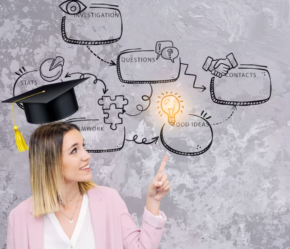
In the exhilarating journey of 10 Proven Memorize Techniques for Students learning, memory is your trusty companion. Whether ...
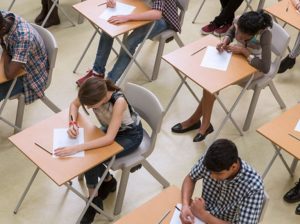
Top 20 toughest exams in world is about exams in the world that required very hard work to ...
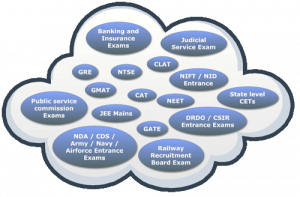
Top 20 toughest exams in India - Exams are the perhaps most toughest moments for any student. A ...

Top 20 Colleges of DU Getting admissions to the top 20 colleges of DU is a dream for every ...

Top 20 NITs of India - Amongst the 31 NITs in India, today, we are talking ...

Here are the Top 12 Artificial Intelligence in Mumbai. Artificial intelligence (AI) refers to the simulation of human ...

As you stand on the Best Science Courses after 12th academic journey, the realm of science beckons, offering ...
Millions of students have entrusted CollegeChalo to facilitate their seamless and smooth admission process to their dream colleges and universities. With CollegeChalo, you can gain a competitive edge by easily accessing exam and course details to stay ahead of the admission journey. What are you waiting for?
Search your dream college